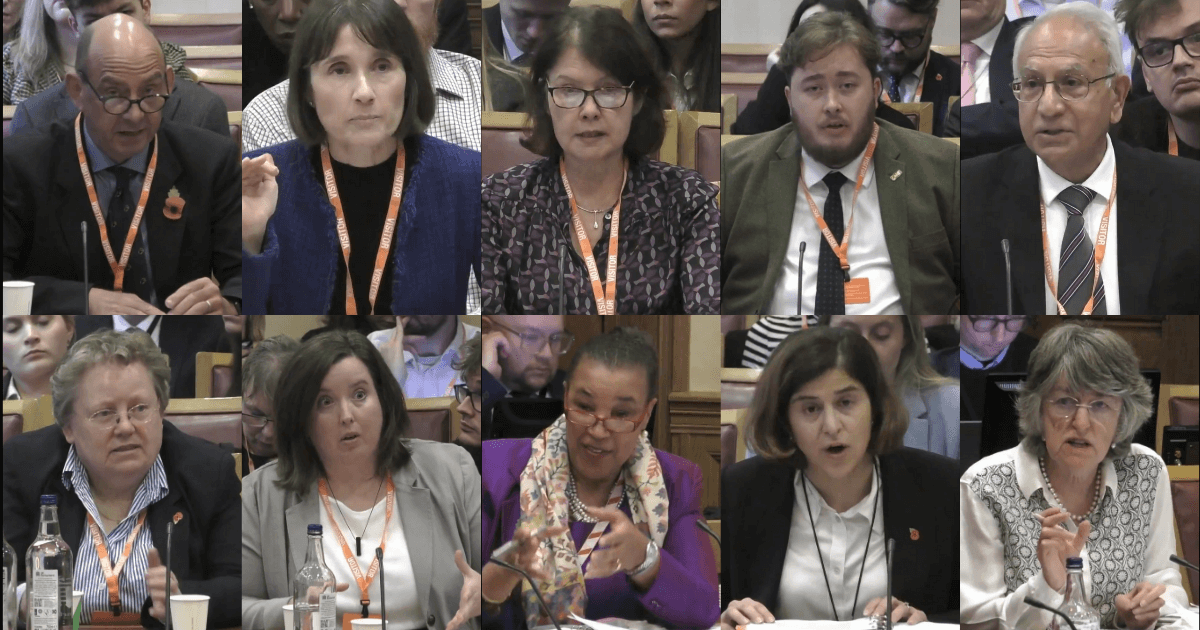The House of Lords assisted suicide Bill select committee held its third day of public sessions last Wednesday, allowing a select group of Peers to interrogate and cross-examine the Terminally Ill Adults (End of Life) Bill through expert witnesses.
The first day of the select committee took place on Wednesday 22 October. A wrap-up of key moments from the first day can be found here. The second day took place on Thursday 23 October, and a wrap-up of its key moments can be found here.
The third day took place on Wednesday 29 October. In the first session of that day, Toby Porter, CEO, Hospice UK; Fraser Rickatson, Policy Manager, Care England; Dr Suzanne Kite, President, Association for Palliative Medicine; Professor Sam Ahmedzai, Emeritus Professor of Supportive and Palliative Medicine, The University of Sheffield; and Professor Katherine Sleeman, Laing Galazka Chair in Palliative Care, King’s College London presented evidence to Peers.
This was followed in the second session by Caroline Abrahams CBE, Director, Age UK; Dr Siobhan O’Dwyer, Associate Professor of Social Care, University of Birmingham; and Professor Martin J Vernon, Chair, BGS Ethics and Law Special Interest Group.
In the third session of that day, Paul Candler, Policy Director, Ministry of Justice, and Sarah Sackman KC MP, Minister of State for Courts and Legal Services, Ministry of Justice, presented evidence to Peers.
Palliative care is in crisis, and assisted suicide would worsen the situation
Toby Porter, CEO at Hospice UK, warned that “uneven access to palliative care, including a hospice sector on the brink, provides a precarious foundation for the introduction of assisted dying into England and Wales”.
He continued, stating that since late January, “almost a dozen hospices have announced significant and involuntary cuts to staff and services due to financial pressures. Hospice beds are being closed and hospice-at-home services curtailed”.
Dr Suzanne Kite, President of the Association for Palliative Medicine, agreed with these points, saying there is a “strong consensus” that palliative care in England and Wales is underfunded and inadequate, and “this constrains choice at the end of life”.
She continued, outlining the problems for hospices if assisted suicide is legalised, asking why their appeal for an opt-out for hospices was ignored. “Hospices are small organisations”, she said. “Even if, as we requested, all organisations were allowed to opt out of providing assisted dying services, particularly since some of them have statutes that prevent them from doing so, within a smaller organisation it is much more difficult to ensure the safety of all your staff to have genuine choice in being able to not opt in”.
“There would also be concern about the impact of providing assisted dying in a setting that already creates some fear among the communities”, Kite explained. “There is already perception that hospices are where you go to die. I work in a hospital setting. I have to reassure people that hospices are there to improve their symptom management and general support, and that they will go home from there as often as not”. Allowing assisted suicides to take place in hospices would likely make this perception even worse, she argued.
Professor Katherine Sleeman, King’s College London Chair in Palliative Care, told the select committee that “patients and families are suffering” as a result of the inadequate provision of palliative care.
She went on to suggest that claims that the UK has the best palliative care in the world are not correct, and assisted suicide promises to make the situation worse. “There have been global reports that have suggested that palliative care in the UK is the best in the world, but those global reports have looked at infrastructure and processes. They say to me that we have the infrastructure available to provide extremely high-quality palliative care. They do not tell us anything about patient outcomes. We have lots of research from this country that shows that outcomes for people at the end of life are often not good”.
Contrary to the argument advanced by certain commentators, Professor Sleeman argued that proper palliative care “has the potential to save the NHS significant amounts of money”.“We know from evidence, and I see it in clinical practice, that palliative care can alleviate the wish for a hastened death. Palliative care can help people who want to die want to live”, she continued.
Baroness Finlay agreed with this point, arguing, “We have heard of other situations where people may have a desire for death but, when they have excellent specialist palliative care, that desire for death goes and they have a desire to continue living”.
Assisted suicide would make the mistrust of health professionals worse
Professor Sleeman warned that legalising assisted suicide would make it “more difficult” to reassure people that palliative care doctors can be trusted.
“For example”, she said, “we did a study last year that showed that one in five people from minoritised ethnic groups think palliative care means giving people drugs in order to end their lives. It sounds shocking, but I witness that. I see that all the time in clinical practice”.
“In clinical practice, we work very hard to build trust with patients, particularly patients from some minoritised groups. There is a real worry that this Bill will make that much harder, not impossible but much harder, because some groups already do not trust us. We already explain to patients, not infrequently, that we are not allowed to hasten their death. That is not legal. If this Bill comes in, that may make that conversation much more difficult”.
Key groups not consulted about the assisted suicide Bill’s proposals
Fraser Rickatson, Policy Manager at Care England, said his sector was “deeply concerned” with the proposed legislation, and that the sector was not consulted on the policies and processes being proposed in the Bill.
“In the summer, we conducted a survey with our membership and the wider sector to understand the preparedness for this Bill within the sector if it were to be legislated and come to pass. We found a sector that was deeply concerned, deeply unaware and not consulted or involved in any conversations about how this Bill may impact on them”, he said.
The proposed assisted suicide Bill is simply not safe, experts say
Professor Sleeman said the assisted suicide Bill would put patients in “a really difficult position” as it is unclear what doctors should do if a person does not die, or if there are other complications. International evidence shows complications are not uncommon.
“I should note that complications occur in about 10%, maybe 8% to 10%, of assisted deaths that happen in Oregon, so this is not a rare event. They are things such as vomiting, regurgitation and seizures. We need to understand what the doctor is allowed to do and what their powers are in the event of those complications or other distress”, she said.
“We do not know which drug or drug combination works better than another because they have not been tested. We do not have strong enough evidence to tell us”, she continued.
Professor Sam Ahmedzai, Emeritus Professor of Supportive and Palliative Medicine at The University of Sheffield, who supports the Bill, said “there will be mistakes and casualties” if assisted suicide is legalised.
The British Geriatrics Society confirmed that someone with dementia could be eligible for assisted suicide under the provisions of the Bill, and warned that people with dementia may unnecessarily choose an early death.
Government neutrality on assisted suicide Bill in question
Sarah Sackman, Minister of State for Courts and Legal Services at the Ministry of Justice, claimed “The Government are neutral” on the assisted suicide Bill, despite having 15 meetings with the sponsors of the Bill and personally voting in favour of the Bill.
Sackman continued, “I am not going to comment on whether what we have before us is better than the status quo”. Despite this, she immediately said that the current law is full of “conundrums” and “very real difficulties”.












